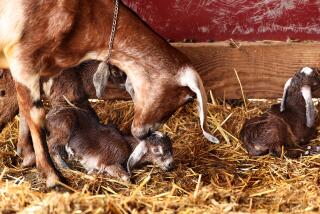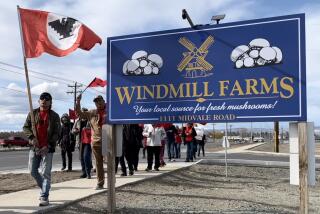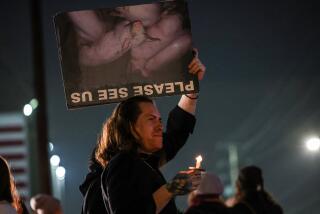Animals Sometimes Suffer as Family Farm Tradition Declines in New Hampshire
- Share via
CONCORD, N.H. — In a corner stall of the fading, lopsided barn, investigators found a decomposed calf. Among the rusted machinery littering the farm outside lay a cow spread on the ice, its pelvis broken and so near death it had to be destroyed.
About eight other cows on the Sunset View Farm had no feed; their water was frozen when investigators arrived at the central New Hampshire farm last month.
Police and animal protection officials say no charges will be pressed against Walter Provo, the 79-year-old owner and operator of what was once a family farm. The reason: Provo is considered as much of a casualty as his animals.
The incident of neglect, officials say, is a symptom of an age where family farmers struggle to pass their farms to coming generations. Yet pride drives some to firmly hold onto their farms regardless of the difficulties.
Lowest Unemployment
The problem is compounded in New Hampshire, animal protection officials say, where the labor pool is tapped by an unemployment rate that has been the nation’s lowest for more than two years.
“There has been a change generally, but specifically in New Hampshire,” says Beverly Leo, agent for the Society for the Prevention of Cruelty to Animals in Concord. Leo investigated the animal neglect case at Provo’s farm.
“Traditionally, farmers have had their sons, daughters, sons-in-laws . . . a new generation to help out,” Leo says. “Now it’s not a foregone conclusion that a youngster is going to take over the farm. It is not as attractive when they have other opportunities. It’s certainly happening in New Hampshire, where we already have a labor shortage.”
Like other cases reported across the state, the neglect case at the Sunset View Farm “is very much a generation thing,” Leo says.
‘Had Cattle Many Years’
“As I understand it, he has had cattle at that location for many years. He’s finding himself physically unable to take care of the animals and unable to admit to himself that he can no longer take care of his own animals,” Leo says.
Although Leo says Provo had provisional help, the farmhand was inexperienced and often unavailable.
The case is not isolated. The New Hampshire Humane Society reports about 50 complaints of neglect of farm livestock each year.
Although the number of livestock farms has decreased by about 20% in the last 20 years, Fritz Sabbow, the Humane Society’s executive director, says the number of neglect reports
Trained People Lacking
“I think the product has exceeded the people to care for them. The labor force has dwindled,” Sabbow says. “You don’t have the trained people you used to have around years ago.”
Those familiar with the subject emphasize that farm animal neglect is not widespread among the state’s 1,000 livestock farms. In fact, state Agriculture Commissioner Steve Taylor disputes the connection between neglect and the labor shortage.
“There is a shortage in farm-hands,” Taylor says. “But in this case I don’t think it explains animal abuse or neglect. This problem has always existed. I don’t think it’s a generation thing.”
State Veterinarian Cliff McGinnis says he has no reason to doubt the observations of animal protection groups, but finds the numbers of reported neglect cases “surprising.”
Not only is there no central state registry for farm animal neglect complaints, but animal protection groups say the few cases that end up in court may be another reason for the problem’s low visibility. Only about one of the 50 cases investigated each year are brought before a judge, Sabbow says.
Despite the best intentions of livestock owners and the workers they can recruit, Sabbow is not optimistic about the prospects of replenishing the farm labor pool in New Hampshire, particularly with experienced workers.
More to Read
Sign up for Essential California
The most important California stories and recommendations in your inbox every morning.
You may occasionally receive promotional content from the Los Angeles Times.










